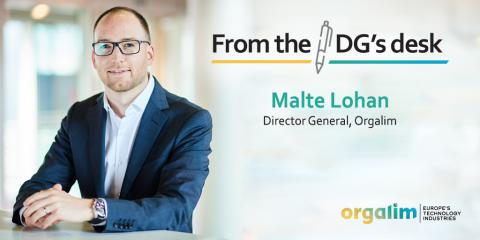From the DG’s desk: A new look at industry’s role in shaping the future of Europe
25 July 2019

It’s an exciting time here in the Brussels bubble. With a newly elected European Parliament beginning its term and the appointment of Ursula von der Leyen as the next European Commission President, EU leaders are setting out their priorities for the next five years: within just weeks of each other, the European Council announced ‘A New Strategic Agenda 2019-2024’ while Ms von der Leyen presented MEPs with her political guidelines for the next Commission.
Having lived and worked in Brussels for much of my life, I have witnessed this new beginning at the start of a legislative term many times before. Yet after eighteen months as DG of Orgalim, I have a fresh perspective on the ‘future of Europe’ debate this time around. Equipped with a deeper understanding of how central the technology industries are in shaping the fabric of our everyday lives – from the energy systems that power our homes to the medical care we receive when we’re sick, from how we get from A to B to how we communicate with each other – I am more convinced than ever that it is not possible to separate the future of Europe from the future of Europe’s industry.
Yet I still find it striking how little this is recognised in the conversations we have around industry, whether political or personal. Not originally from an industrial background myself, I have had conversations with friends and extended family who are suspicious of the private sector – whether drawing on an old-school leftist view of companies profiting at the expense of workers, or a more 21st century critique of corporate power and wealth operating against the interests of ordinary citizens. At the same time, these are generally progressive people that believe in the power of innovation to make the future better: putting smart security and energy technology in their homes, trying every latest mobility solution on offer to get them out of traffic jams, using fintec apps to manage their banking, monitoring their babies’ health and sleep patterns online. These innovations are only possible thanks to a strong and dynamic industry – but nevertheless many hold on to their scepticism about shadowy ‘business interests’.
I think this reflects a broader reflex in our public discourse that draws an artificial line between ‘industry’ on one side and ‘society’ on the other, with policy as a mediator between the two. Reading the European Council’s Strategic Agenda and President-Elect von der Leyen’s political guidelines for the new Commission, I recognise a similar tendency: industry gets a nod, certainly, but not as a vote winner and almost always within the one-dimensional context of strengthening Europe’s economy. Of course industry’s role as the backbone of our economy is and will remain vitally important to the future of Europe. But to make a difference across the spectrum of issues that make the EU a place we are proud to call home, policymakers need to better recognise the key role industry plays in improving our lives more broadly.
Ultimately, the technology industries we represent are an important channel through which the impact of EU policy is felt by citizens in their daily lives. From tackling climate change to addressing demographic challenges, from reinvigorating the EU’s economy to making our cities healthier: the innovative products and systems developed in our industry will help policymakers deliver on the priorities that matter most to their constituents over the next five years and beyond.
With this new regular feature ‘From the DG’s desk’, I will be sharing my thoughts on these intersections between policy, industry and society. Over the remaining weeks of summer, we will be kicking off with a series zooming in on the key priorities of EU policymakers as they embark on a new legislative period. Taking the headlines of the European Council’s Strategic Agenda as a jumping-off point, I will look at how our industries can contribute to the high-level objectives in the months and years ahead:
- Protecting citizens and freedoms
- Developing our economic base: the European model for the future
- Building a climate-neutral, green, fair and social Europe
- Promoting Europe’s interests and values in the world
So join me back here every Thursday for the next six weeks – and if you want to weigh in on how industry and policy can shape a future that’s good for Europe, do share your thoughts on Twitter or LinkedIn. Looking forward to starting a conversation!